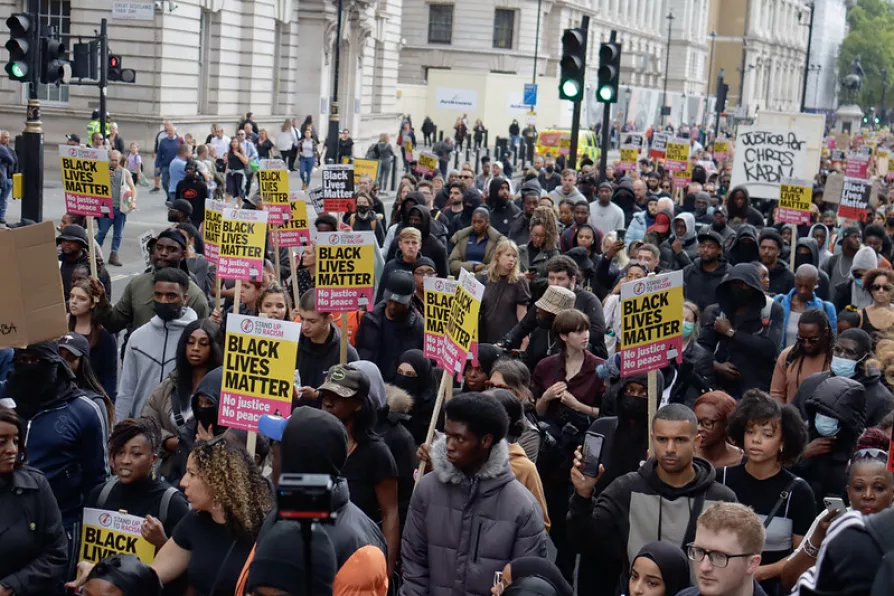
 Thousands marched to New Scotland Yard to demand justice for Chris Kaba on Saturday
[Steve Eason / Creative Commons]
Thousands marched to New Scotland Yard to demand justice for Chris Kaba on Saturday
[Steve Eason / Creative Commons]
FEW reporting errors lay bare the gulf between media elites’ view of the public and real working-class feeling as clearly as Sky News’ misrepresentation of a march demanding justice for Chris Kaba, the young black man shot dead by a Met Police officer last Monday.
Demonstrators carrying placards reading Justice for Chris Kaba and Black Lives Matter were misidentified in helicopter footage as mourners seeking to pay respects to the late queen and express “their good wishes for the new king.”
Sky News has apologised, but the assumption that a march in central London at the weekend must have been about supporting the monarchy says a lot about our broadcast media.
Together with the mainstream press, wall-to-wall coverage dedicated solely to memories of Elizabeth II and favourable publicity about Charles III give the impression that there are no other issues of importance in Britain at the moment.
The queen was popular, but the propaganda effort being mounted by the Establishment is clearly out of proportion with public feeling.
This may be why football matches were postponed over the weekend while more “genteel” sports went ahead: authorities were unsure that working-class crowds at football matches would stick to the script.
Similarly, initial reports that Prime Minister Liz Truss would go on a tour of the four nations of the United Kingdom (as defined by our government, treating the British-ruled part of Ireland as a nation) with the new King were quickly modified: Truss will in fact simply accompany Charles at “services of reflection” in Edinburgh, Belfast and Cardiff.
The scaling back suggests that a Conservative play to use the new king to promote unionism quickly ran into trouble, whether with the devolved administrations or because it was realised such a tour would do nothing for the popularity of either the king or the continued existence of the UK in the places concerned.
The Establishment’s problem is that for lots of people, the narrative of a benevolent and protective British state now being promoted is miles from their own experience of that state.
This was certainly the case for the march and rally for Chris Kaba by people who are also mourning — but who at the same time are organising.
An unarmed black man, soon to be a father, has been shot dead by the police. And that is unacceptable, as singer Stormzy told the crowd: “What they’ve done is they’ve killed someone. We can’t sugarcoat it.”
Stormzy was right too that we need sustained protest and pressure, because usually “when these people do these things, they get away with it.”
We might recall that Cressida Dick — whom a recent official inquiry tried to paint as a victim, improperly forced from office by London Mayor Sadiq Khan — received nothing but promotion after promotion for heading the operation which killed another innocent unarmed young man, Jean Charles de Menezes, chased by officers onto a Tube train and shot multiple times in the head in 2005. Nobody has ever been punished for that killing.
There are dangers for the left in going along with the state-organised obsequies to the monarchy beyond the political role of the monarchy itself, which is of course reactionary. This is a celebration of the British state as a whole, including a police force publicly exposed as infested with racism, violent misogyny and homophobia.
A police force which the Conservative government plans to hand even greater powers to suppress protest and arrest demonstrators at its own discretion.
Resisting those plans, holding the powers that be accountable for outrages like the killing of Chris Kaba, means recognising the British state for the brutal institution that it is: and lining up to shout “God Save the King” while pausing engagement in the political struggles of the day won’t help us to do that.

STEPHEN ARNELL wonders at the family resemblance between former prince Andrew and his great-uncle ‘Dickie’












